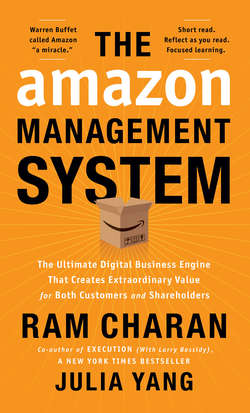Читать книгу The Amazon Management System - Ram Charan - Страница 28
На сайте Литреса книга снята с продажи.
1.0: Online bookstore
ОглавлениеWhy books?
You can probably come up with several obvious reasons yourself. Books are highly standardized, the market is big, and the logistics of shipping books is relatively less challenging than shipping other things.
The less obvious reason is that at that time the book market was heavily dominated by only two distributors. For a start-up, it was much easier to deal with two, rather than thousands, if not hundreds of thousands, suppliers at the same time.
But the most important reason was that the Internet could provide enormous competitive edges in the book game.
Why? Back then, a typical bookstore would carry 100,000 books in stock, only a fraction of the roughly 3 million titles in print. All physical bookstores were constrained by a practical ceiling of how many books they could carry, while an online bookstore could offer an “unlimited selection”.
This was exactly the crucial differentiator that Bezos had been looking for to feed his game-changing ambition. He understood that the Internet would change customers’ shopping experience in a fundamental way. So what other magic tricks could the budding Internet do?
There were two more worth noting. One is customer reviews. Unlike the flattering reviews by famous figures included on physical books as part of marketing efforts, reviews on the Internet would come from ordinary readers, direct, authentic and unfiltered. The unlimited space on the web meant that all reviews, positive or negative, could be shown in their entirety, as posted.
The other is personalization. Bezos envisioned that one day they could achieve the ultimate in personalization: a different version of the website for each customer based on the patterns and preferences derived from his or her previous shopping records. This would be a whole new experience for customers, made possible only on the emerging Internet.
With “unlimited selection,” “unfiltered customer reviews,” and “ultimate personalization,” the three unmatchable and innate advantages of the Internet, Bezos was confident that no physical bookstores, no matter how big they were then, could be serious competitors in the long run.
That’s perhaps why the word “Amazon” instantly enchanted Bezos when he tried to find a good name for his start-up. He had experimented with names such as Awake.com, Browse.com, Bookmall.com, Relentless.com, Makeitso.com, as well as Cadabra. Still searching, Bezos referred to the dictionary. Luckily the name hunt didn’t last long. Amazon jumped out at him. It was love at first sight. Amazon “is not only the largest river in the world. It’s many times larger than the next biggest river. It blows all other rivers away,” Bezos said.
Yes, Amazon, it was.
The name spoke to Bezos’s dramatic ambition at the time. His goal was to build an online bookstore that would not only be the largest in the whole world, but could also blow all other bookstores away.
Clearly Bezos achieved his goal. Amazon has become the indisputable leader in the book market. In 2018 in the US, it commanded a dominating share of 42% in physical books and a staggering share of 89% in E-books (as shown below).
